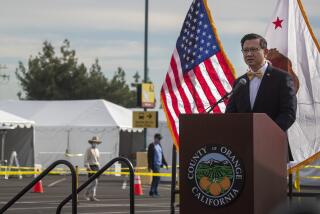Keysor Accuses Lynch of ‘Secret Deal’ in Financing His Campaign for Assessor
- Share via
Los Angeles County assessor candidate Jim Keysor Friday attacked a “secret deal” that he says has forced taxpayers to help finance the campaign of his opponent, John J. Lynch.
“The same man who wants to be elected to a position of responsibility in our tax system manipulated the system to obtain what amounts to a . . . personal loan” of public funds, Keysor said at a downtown press conference.
Lynch denied any wrongdoing.
Before the June primary, Lynch, a deputy assessor and part-time lawyer, had a campaign pitch included in the official voter pamphlet at about a $47,000 cost to the taxpayers. He did that by filing an affidavit of indigency, swearing he was unable to pay the fee.
Materials Mailed
Later, Lynch, who owns a home in Northridge and said he earns about $27,500 a year, had his affidavit rejected by the county. But it was too late to stop his statement from being included in the materials mailed to all eligible voters.
Considered an also-ran, Lynch surprised himself and other candidates by topping the field of 12 primary candidates to earn a runoff spot against Keysor in November. Critics, including some other candidates who had no statement in the voter’s pamphlet, claimed that Lynch had gained an unfair advantage through misrepresentation.
After the primary, Lynch agreed to repay the funds. County officials said federal regulations prevented them from discussing the details. But documents released by Lynch Friday showed that he agreed to repay the money at a rate of $1,000 a month, with the unpaid balance due in December. The settlement does not include provisions for interest on the debt.
Ballot Packet
Lynch still owes the county most of the money. But Keysor noted Friday that Lynch recently came up with more than $27,000 to pay for another campaign pitch in the county’s ballot packet for the Nov. 4 election.
“Suddenly, this man who claimed he was indigent had an awful lot of cash to throw around,” Keysor said.
Lynch said he had to borrow the $27,000, adding, “All I can tell you is I’ve done nothing illegal.”
Lynch said he filed the indigency affidavit in the primary contest because he did not have the money to pay the fee. He said he listed all his assets as required and did not learn until after the election that only those living below the poverty line are considered indigents by the county.
County officials said the form is considered an “application” to avoid the fees.
Turns Over Affidavits
Marcia Ventura, a spokeswoman for the county registrar-recorder’s office, which oversees elections, said her office simply turns the affidavits over to the county Collection Department for review.
The indigency forms are available to all candidates, but few use them. Only three were filed this year, and none were filed for several years previously, said Donna Doss, a division manager in the county Collections Department.
Doss said she did not know that Lynch had paid $27,000 for his November ballot statement.
“We are always concerned about someone who has additional assets to retire any debt,” she said.
But she added her department has no legal recourse as long as Lynch is making payments on the previous debt.
Attempting to cast doubt on Lynch’s integrity is partially a response to Lynch’s charge that Keysor, a business executive, misrepresented his occupation on the already printed November ballot.
After the June primary, Assessor Alexander Pope, a Keysor ally who will be leaving office, named Keysor to a top “volunteer” job in his office. A few weeks later, Keysor listed himself as a “businessman/deputy assessor” on the ballot and claimed credit for keeping the assessor’s office “efficient” in his statement that will appear in the voter’s pamphlet.
More to Read
Sign up for Essential California
The most important California stories and recommendations in your inbox every morning.
You may occasionally receive promotional content from the Los Angeles Times.













